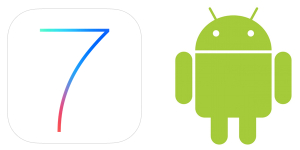Saturday
Sep142013
iOS vs. Android = Mac vs. Windows? Not Really
 Saturday, September 14, 2013 at 12:16PM
Saturday, September 14, 2013 at 12:16PM
 According to Comscore, Android's rise to dominance looks like it has stalled and may even be in slight decline. In fact, "dominance" is probably the wrong word. Certainly, the number of Android devices produced is much larger than the number of iOS devices (depending on who you believe, the ratio is somewhere around 60/40), but it's unclear how many of those Android devices are in BestBuy or Wal Mart warehouses or somewhere else in the supply chain. If there are that many more Android devices out there in the hands of consumers, it's hard to prove they're being used. Mobile Safari, the default iOS browser continually maintains over 60% of all mobile web usage. That number is even more impressive when you consider there are multiple browsers available for iOS, but Mobile Safari isn't available on Android devices. Some estimate over 75% of mobile web access happens on iOS. Why?
According to Comscore, Android's rise to dominance looks like it has stalled and may even be in slight decline. In fact, "dominance" is probably the wrong word. Certainly, the number of Android devices produced is much larger than the number of iOS devices (depending on who you believe, the ratio is somewhere around 60/40), but it's unclear how many of those Android devices are in BestBuy or Wal Mart warehouses or somewhere else in the supply chain. If there are that many more Android devices out there in the hands of consumers, it's hard to prove they're being used. Mobile Safari, the default iOS browser continually maintains over 60% of all mobile web usage. That number is even more impressive when you consider there are multiple browsers available for iOS, but Mobile Safari isn't available on Android devices. Some estimate over 75% of mobile web access happens on iOS. Why?Well, after owning a Nexus 7 for several months (the original and now the latest version), I absolutely understand. I own an iPhone 5 and a 3rd generation iPad. I really like the form factor of the iPad Mini, but after a couple of trips to the Apple store I realized how spoiled I was by the two retina displays of my existing iOS devices and just couldn't lay down the $400 for the non-retina Mini. So, I spent $200 for a Nexus 7. Let's just say I was "bi-curious". The original Nexus 7 was a joke. Sure, the form-factor was great and the Asus build quality was really good, but its performance was completely lousy. The 1280 X 800 screen was nice enough, but Android did such a poor job of putting things on it, I didn't want to look. Scrolling was totally skippy, buttons were hard to press consistently and nothing ever seemed to fit properly on the screen. Email continually ran off the right side of the screen and web pages in any browser I tried were either too tiny to read or suffered the same fate as email. It seemed that anything I tried to view required a "pinch" or "spread" to adjust. This frustration was compounded by the Nexus's herky-jerky video performance. With every iOS device I've ever owned, pinching the screen yielded predictable, controllable, smooth results. Doing so with the Nexus 7, on the other hand, was a complete crap shoot. Sometimes it zoomed, sometimes it stopped in the middle of the gesture, sometimes it scrolled in the direction of one finger and sometimes it just didn't do anything. I chalked these problems up to the fact that it was a first generation product and thought Google would surely do better with revision 2. When I upgraded to the newest Nexus 7 a few weeks ago, I quickly realized how wrong I was. The new Nexus 7 with its greatly improved hardware specs performs only marginally better than its predecessor. It was then when I realized just how spoiled by Apple's attention to detail I've become. The new Nexus 7 with all it's eye-popping specs still can't seem to format a web page correctly, scroll smoothly or get all the text of an email onto its 1920 X 1200 screen.
Aside from the sketchy performance, the Nexus 7 suffers from the same malady as all Android tablets, a dearth of true tablet apps. Most iPad apps I've grown to depend on offer Android versions, but few of these are tablet-specific. Apps like Evernote, Dropbox, Twitter and Yelp really use the iPad's extra screen real estate to enhance user experience, but on the Nexus 7 they're just smartphone apps that are either blown up bigger or spread out more on the bigger screen. As such, they're designed to work one-handed, but on the Nexus 7 you'd need hands the size of tennis rackets or at least 6" thumbs to reach everything that way.
This brings me to the heart of the matter. The Android ecosystem will never be as good as Apple's. We've all heard the "Android is to iOS as Windows is to Mac" analogy. It's something I've come to believe...but only up to a point. Like the Mac did with personal computers in 1984, iOS set the standard for smartphone and tablet user interface and capability. Like Windows in the late 80s, Android arrives a few years later with a "me too" product that isn't nearly as good, but will run on almost any hardware and costs little to nothing. Manufacturers eat it up and provide copycat products that appeal to the uninformed and the mass of users whose main consideration is price. Predictably, Android's market share soars and within a couple of years it surpasses iOS in the number of devices sold. And why wouldn't it? There's more Chevys on the road than BMWs, people buy more hamburger than filet mignon. The point is, there is always going to be a large market for something cheap and "good enough". But this is where my belief in the analogy ends.
Unlike Microsoft of the 90s, Google isn't raking in cash with Android. They give it away for free. Also, aside from maybe Samsung, Android smartphone and tablet makers can't seem to make a buck either. Right now, it certainly doesn't look like any empires will be built on the strength of Android market share. Also, In 1990 a Windows computer cost less than half what a Mac cost. The Windows equivalent of a $2400 Mac was only $1200. iPhones and iPads may cost twice as much as a similar Android device, but the difference is only a couple hundred bucks...and that's in today's dollars. This is well within the discretionary spending limits of many (if not the majority of) consumers. There's just no way to compare the two. The scales are just too different. Just one more way the analogy fails.
In the 90s, the explosive growth of Windows spawned a huge third party developer ecosystem and software titles for the platform outpaced the Mac by almost 10 to 1. This secured Windows as the default operating system for home and business for years to come. Today, even with Android's huge numbers, this hasn't happened yet. While the Google Play Store is growing, Apple's App Store is by far the dominant player in this area, both in quantity but more importantly, quality. Apple did have a big head start and although they've received a lot of criticism for it, their curative approval process for apps yields an overall better product for iOS customers. It's also a matter of fact that Apple customers are much more willing to pay for apps than their Android counterparts. It just makes sense that better paid developers make better products and the App Store ecosystem is evolving accordingly. This may be a game of catch up Android cannot win.
So, it looks like we'll have two vibrant mobile platforms for the foreseeable future. The Android minions will probably keep their bragging rights over its market percentage lead and Apple will continue to mint money with iOS. I just have to believe that the platform that generates the most revenue for itself and its developers has a better chance of coming out on top eventually. The good news for us all is there are two big players competing for our allegiance. This competition will keep everyone involved pushing the technology forward. That means more cool, affordable stuff for us.
UPDATE (9/19/2013): Well, well, Tim Cook seems to agree with me. Don't believe me? Check out this interview he did with BloombergBusinessWeek.



Reader Comments